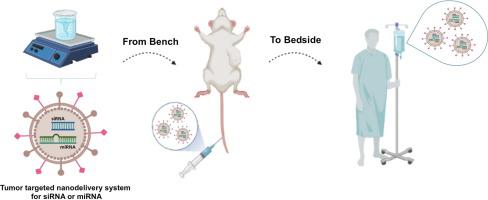Advanced Drug Delivery Reviews ( IF 16.1 ) Pub Date : 2022-01-19 , DOI: 10.1016/j.addr.2022.114113 Goknur Kara 1 , George A Calin 2 , Bulent Ozpolat 3

|
Over the past decade, non-coding RNA-based therapeutics have proven as a great potential for the development of targeted therapies for cancer and other diseases. The discovery of the critical function of microRNAs (miRNAs) has generated great excitement in developing miRNA-based therapies. The dysregulation of miRNAs contributes to the pathogenesis of various human diseases and cancers by modulating genes that are involved in critical cellular processes, including cell proliferation, differentiation, apoptosis, angiogenesis, metastasis, drug resistance, and tumorigenesis. miRNA (miRNA mimic, anti-miRNA/antagomir) and small interfering RNA (siRNA) can inhibit the expression of any cancer-related genes/mRNAs with high specificity through RNA interference (RNAi), thus representing a remarkable therapeutic tool for targeted therapies and precision medicine. siRNA and miRNA-based therapies have entered clinical trials and recently three novel siRNA-based therapeutics were approved by the Food and Drug Administration (FDA), indicating the beginning of a new era of targeted therapeutics. The successful clinical applications of miRNA and siRNA therapeutics rely on safe and effective nanodelivery strategies for targeting tumor cells or tumor microenvironment. For this purpose, promising nanodelivery/nanoparticle-based approaches have been developed using a variety of molecules for systemic administration and improved tumor targeted delivery with reduced side effects. In this review, we present an overview of RNAi-based therapeutics, the major pharmaceutical challenges, and the perspectives for the development of promising delivery systems for clinical translation. We also highlight the passive and active tumor targeting nanodelivery strategies and primarily focus on the current applications of nanoparticle-based delivery formulations for tumor targeted RNAi molecules and their recent advances in clinical trials in human cancers.
中文翻译:

癌症中基于 RNAi 的疗法和肿瘤靶向递送
在过去的十年中,基于非编码 RNA 的疗法已被证明在开发癌症和其他疾病的靶向疗法方面具有巨大潜力。microRNA (miRNA) 关键功能的发现在开发基于 miRNA 的疗法方面引起了极大的兴奋。miRNA 的失调通过调节参与关键细胞过程的基因,包括细胞增殖、分化、凋亡、血管生成、转移、耐药性和肿瘤发生,从而导致各种人类疾病和癌症的发病机制。miRNA(miRNA模拟,anti-miRNA/antagomir)和小干扰RNA(siRNA)可以通过RNA干扰(RNAi)以高特异性抑制任何癌症相关基因/mRNA的表达,因此代表了靶向治疗和治疗的显着治疗工具。精准医学。基于 siRNA 和 miRNA 的疗法已进入临床试验,最近三种基于 siRNA 的新型疗法获得了美国食品药品监督管理局 (FDA) 的批准,这标志着靶向疗法新时代的开始。miRNA 和 siRNA 疗法的成功临床应用依赖于针对肿瘤细胞或肿瘤微环境的安全有效的纳米递送策略。为此,已经开发了有前途的基于纳米递送/纳米颗粒的方法,使用多种分子进行全身给药,并改善了肿瘤靶向递送并减少了副作用。在这篇综述中,我们概述了基于 RNAi 的疗法、主要的制药挑战以及开发有前景的临床转化递送系统的前景。我们还强调了被动和主动肿瘤靶向纳米递送策略,主要关注基于纳米颗粒的递送制剂在肿瘤靶向 RNAi 分子中的当前应用及其在人类癌症临床试验中的最新进展。



























 京公网安备 11010802027423号
京公网安备 11010802027423号